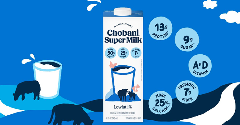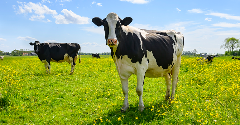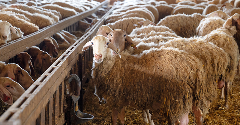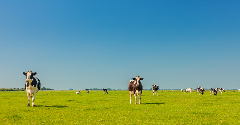News
Nestlé reformulates US ice cream
26 Apr 2016Nestlé Dreyer’s Ice Cream has announced key ingredient improvements to six US brands including Dreyer’s, Häagen-Dazs, Outshine, Skinny Cow, Nestlé Ice Cream and Nestlé Drumstick.

Nestlé Dreyer’s Ice Cream has announced key ingredient improvements to six US brands including Dreyer’s, Häagen-Dazs, Outshine, Skinny Cow, Nestlé Ice Cream and Nestlé Drumstick. The company said that this is the latest milestone in a multi-year effort to update existing products across the entire portfolio of brands. With a focus on simplifying ingredient lists while maintaining the same taste, the newest changes vary across more than 100 products, with examples including the removal of artificial colours and flavours, high fructose corn syrup and GMO ingredients. Other noteworthy accomplishments, Nestlé said, include the use of fresh milk from cows not treated with rBST, the addition of more real fruit or fruit juice and a reduction in sugar by an average of 11% on select products.
In December of last year, Nestlé also announced that it will transition to using only cage-free eggs in all of its U.S. food products, including ice cream, within the next five years. Nationwide roll-out for the newly updated products began in March 2016.“Nestlé Dreyer’s Ice Cream understands that consumers want to know what’s in their food, where those ingredients come from and how the food products they purchase are made,” said Robert Kilmer, president, Nestlé Dreyer’s Ice Cream. “We are the industry leader when it comes to innovation and, as consumer demand centers on transparency and choice, we are responding with new ways to make ice cream even better. Using simpler ingredients that our consumers can recognize, and removing those that don’t belong, is a natural next step for our brands.”The company cites as an example of its ingredient innovation Dreyer’s Slow Churned which features half the fat and one-third fewer calories than full-fat ice cream, and was introduced in 2004, when consumer preference focused on lower calorie and reduced fat options, without sacrifice of flavour. Now, Nestlé has announced nine of its most popular Dreyer’s Slow Churned flavours will be branded Slow Churned Simple Recipes, to reflect their simpler ingredient profile. The improved recipes feature a label with seven or eight ingredients, reduced from an average of 22. Additional changes include the removal of all artificial colours and flavours, high fructose corn syrup and GMO ingredients along with the addition of fresh milk from cows not treated with rBST. Examples of specific ingredients removed include carrageenan and xantham gum, replaced with ingredients such as pectin. The team, led by research scientist Michael Sharp, are said to have analysed every ingredient and recipe to determine the opportunity to simplify the ingredient list.“Our mission is to deliver the best product for the consumer,” said Sharp. “In the case of Simple Recipes, this meant maintaining the great taste and texture of an established and well-liked product with simpler ingredients that consumers understand.”Nestlé plans to update the remaining Slow Churned flavours by the end of 2017 and will continue to update other products across all brands in its portfolio.Related news

Danone removes NutriScore from products
20 Sep 2024
Following an algorithm update that gives some of its sweetened drinks a worse score, Danone has removed the front-of-pack label, NutriScore, from all of its products – putting profit before public health, say campaigners.
Read more
Chobani develops shelf-stable, prebiotic-enriched Super Milk
12 Sep 2024
Chobani has launched a prebiotic-enriched, shelf-stable, high-protein dairy milk to support people in disaster zones who need a nutritious drink that does not require refrigeration.
Read more
Tesco trials methane mitigation supplement for dairy cattle
5 Sep 2024
Tesco is trialing a methane-reducing feed supplement for one of its key UK dairy farms, sustainable UK milk producer Grosvenor Farms.
Read more
Sheep and goat plague: A new threat to Greece’s feta production
27 Aug 2024
A recent goat and sheep plague outbreak threatens feta production in Greece. The flagship product accounts for roughly 10% of the country’s food exports, but Greek authorities say there is no cause for concern.
Read more
Nestlé develops a new fat reduction method for dairy ingredients
26 Aug 2024
A Brazil-based Nestlé research and development team has developed a way to reduce the fat in milk powder by as much as 60%, without impacting the key characteristics that consumers enjoy.
Read more
Dutch court rules against plant-based butter brand ‘Roombeter’: Only dairy products allowed to use the word ‘cream’
26 Jul 2024
A Dutch court has ruled against Upfield’s plant-based butter, Roombeter, stating that its use of the word ‘room’ (cream) in the product name violates European regulations that protect dairy-related terms allowed for dairy products only.
Read more
How will Denmark’s 2030 carbon tax impact farming?
12 Jul 2024
Denmark has announced plans to implement Europe’s first carbon tax on agriculture from 2030, targetting the farming sector’s CO2 emissions. How will it be implemented and how have farmers reacted?
Read more
Sweden updates front-of-pack Keyhole labelling rules
11 Jul 2024
The Swedish Food Agency has announced updates to the voluntary Keyhole logo, used in four Nordic countries, following recommendations to improve nutrition labelling.
Read more
Consumers dislike faba beans’ sensory profile
3 Jun 2024
Consumers display low acceptance of faba beans, with sensory properties such as bitterness a core concern, a study suggests. However, for product varieties such as cocoa-free chocolate, this attribute could prove to be a benefit.
Read more
Food scientists uncover new way to preserve nutrient and flavour quality
29 May 2024
Researchers have developed a method that guarantees food safety for low-moisture products, such as dried milk, while maximising quality by retaining vitamins, minerals, and flavours, they say.
Read more